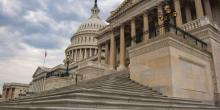Join us Thursday, March 4th to Talk About Overbuilding - Episode 7 of Connect This!
The notion that states and the federal government should go to great lengths to make sure any funds they distribute for broadband infrastructure don't accidentally create competition for private providers is one that perplexes us. While the monopoly cable and telephone companies (and their Republican allies) have gone to great lengths over the last two decades to push the narrative that anything more than monopoly control in an area constitutes "wasteful spending," we're not so sure.
Join us Thursday, March 4 at 2 ET, to talk about overbuilding with Travis Carter (CEO, US Internet), Deb Socia (President/CEO, The Enterprise Center), and Brian Worthen (CEO, Mammoth Networks).
Subscribe to the show using this feed.
Email us [email protected] with feedback and ideas for the show. We appreciate your patience as we continue to explore the livestream format, and I welcome any advice or production ideas you have (email me at [email protected]).
For timely updates, follow Christopher Mitchell or MuniNetworks on Twitter and sign up to get the Community Broadband weekly update.
Watch below, or on YouTube Live.



